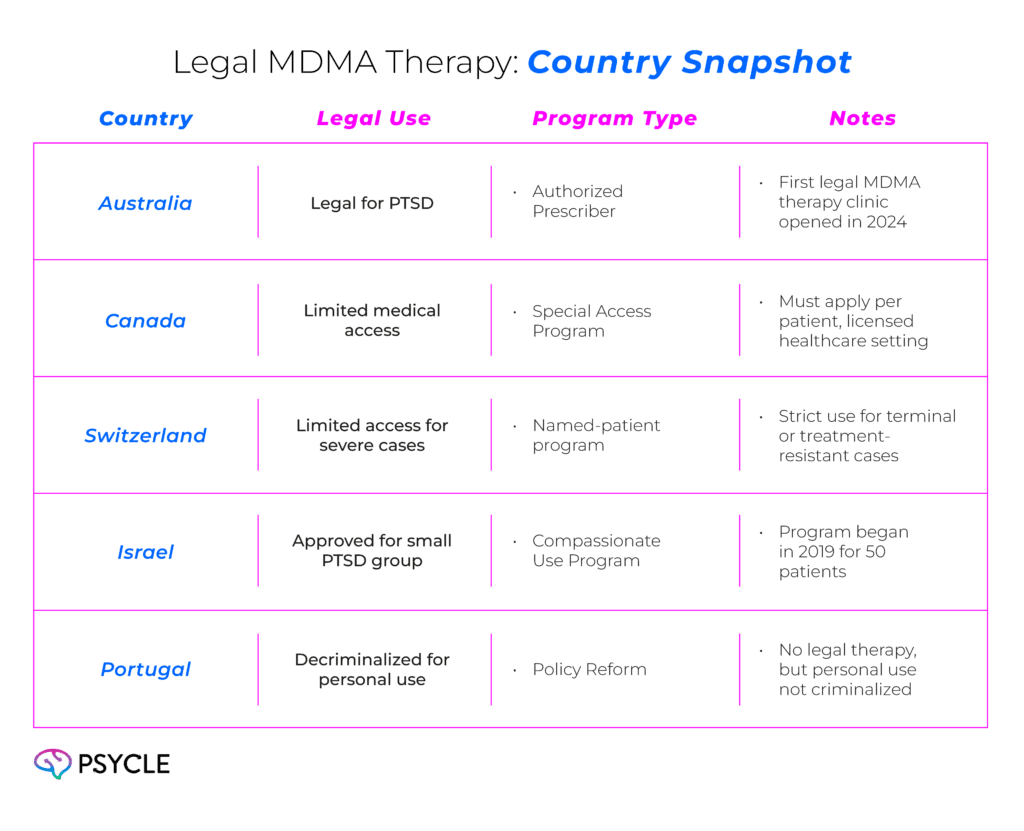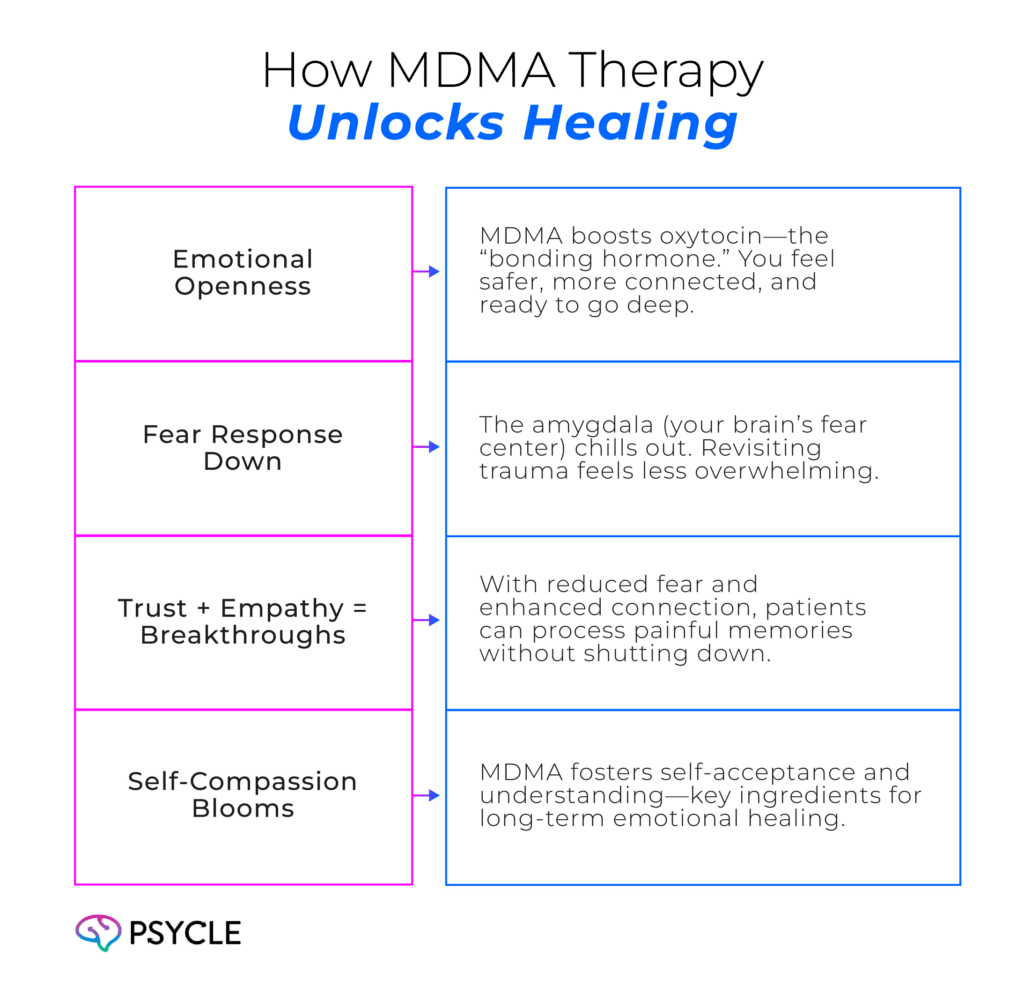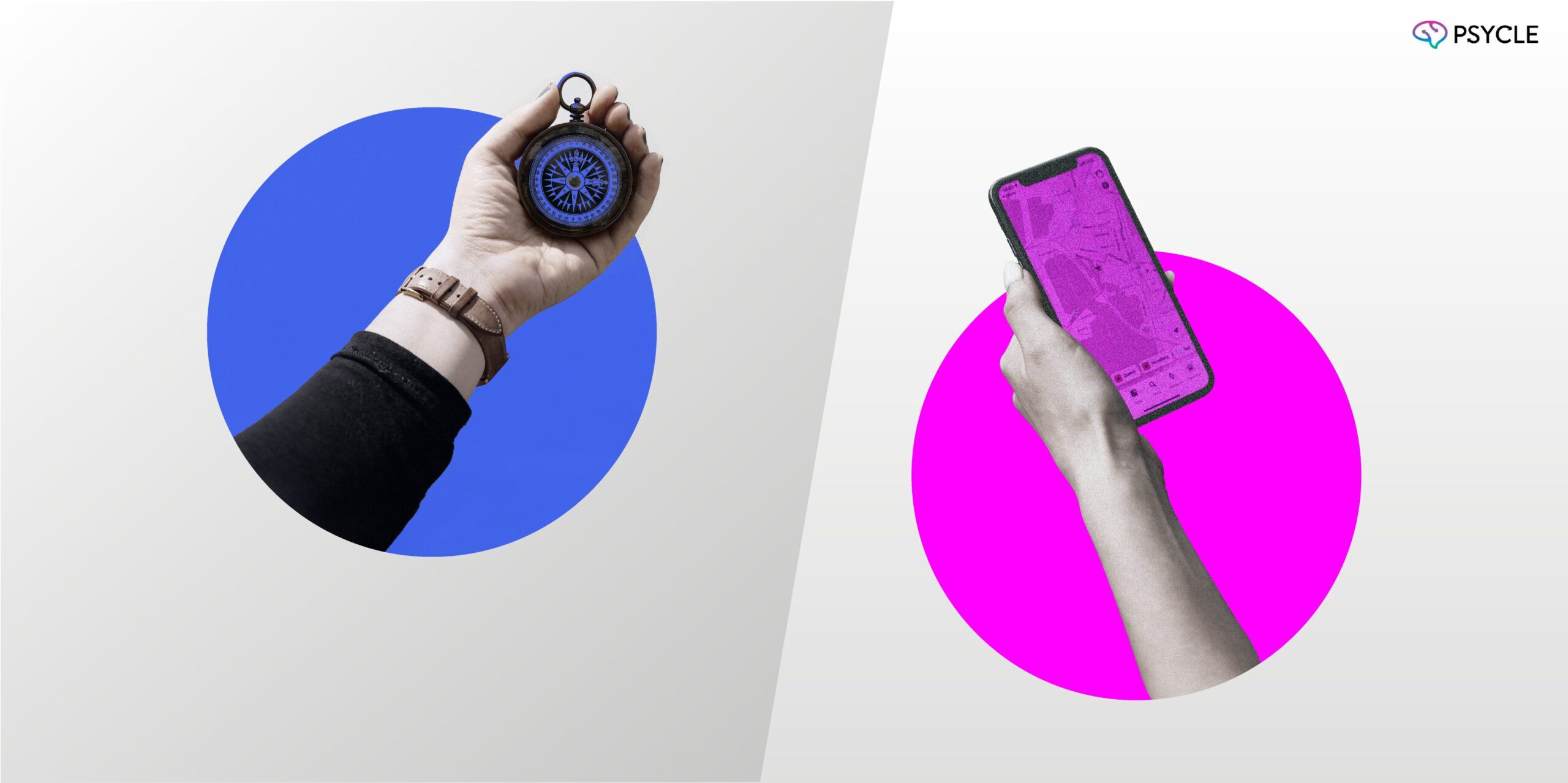MDMA therapy is gaining traction as a promising treatment for trauma and mental health issues, with research showing positive results for conditions like PTSD. While the drug remains illegal in many places, some countries are beginning to pave the way for its medical use.
This article explores where MDMA therapy is legal, how it works, and the growing interest in its therapeutic potential.

Key Takeaways
- MDMA therapy shows promise for treating PTSD and other conditions, with research backing its potential benefits.
- Countries like Australia, Canada, Switzerland, and Israel are leading the way in MDMA therapy through special access programs and regulations.
- MDMA remains illegal in the US but could be on the path to legalization with ongoing research and political support.
- Decriminalization policies in some countries, like Portugal and the Netherlands, reduce criminal penalties for personal use of MDMA, though it’s not fully legalized.
- Experts emphasize the need for strict regulations to ensure MDMA is used safely and responsibly if legalized for medical use.
Understanding MDMA Therapy
History of MDMA Research
MDMA (3,4-methylenedioxymethamphetamine) is a psychoactive drug known for enhancing mood, empathy, and emotional openness. It was synthesized in 1912, and therapists began exploring its therapeutic potential in the 1970s and 1980s.
Early studies showed MDMA could help people process emotions and trauma more openly, leading it to be explored in personal and couples therapy. However, with growing recreational use in the rave scene, MDMA was criminalized in 1985.
In the year 2010, the Multidisciplinary Association for Psychedelic Studies (MAPS) published the first modern Phase 2 trial investigating MDMA for PTSD. The study showed MDMA, combined with psychotherapy, had significant benefits for treatment-resistant patients, spurring a renewed interest in its therapeutic use. This led the FDA to approve MDMA with breakthrough therapy status in 2017 to help speed up the drug’s development.
The past decade has seen numerous studies conducted on MDMA, including a large Phase 3 study with over 300 participants published in 2023. Most research has focused on MDMA’s usefulness in PTSD, but the therapy has also been studied for major depressive disorder (MDD), eating disorders, and anxiety related to end-of-life.
How Does MDMA Therapy Work?

MDMA therapy works by altering brain activity to create a state of emotional openness and reduced fear. MDMA increases the release of oxytocin, often called the “bonding hormone,” which promotes feelings of trust and empathy. This enhanced connection helps patients feel safe discussing and processing difficult emotions with their therapist.
At the same time, MDMA reduces activity in the amygdala, the brain region responsible for fear and threat responses. This effect makes it easier for individuals to revisit traumatic memories without being overwhelmed by anxiety or distress.
By combining these effects, MDMA helps patients explore their trauma in a way that feels less threatening and more manageable. The empathy and self-compassion facilitated by the drug allow individuals to confront painful experiences with greater understanding and acceptance, fostering profound emotional healing.
Is MDMA Therapy Legal in the US?
MDMA therapy is currently illegal in the United States, and MDMA is classified as a Schedule I drug under the Controlled Substances Act. This ruling means MDMA is considered to have no accepted medical use and a high potential for abuse. Currently, the only legal way to access MDMA therapy is by participating in approved clinical studies, such as those conducted by research organizations like MAPS.
In August 2024, the FDA rejected the approval of MDMA-assisted therapy, citing concerns about the reliability of clinical data. However, under the new Trump administration, legal MDMA therapy may be on the cards. Robert F. Kennedy Jr, a strong advocate for psychedelic therapies, is currently Trump’s choice for the country’s secretary of the Department of Health and Human Services.
Moreover, J.D. Vance, the Vice President-Elect, discussed using psychedelics to treat veterans in a Joe Rogan podcast.
Legal MDMA-Assisted Therapy in Australia
Australia has made significant strides in the field of MDMA-assisted therapy, becoming the first country to permit the prescription of MDMA for PTSD in July 2023.
To prescribe MDMA, a registered psychiatrist must become an Authorized Prescriber (AP) under the Therapeutic Goods Administration’s (TGA) Authorized Prescriber scheme. Before applying for AP approval, the psychiatrist must receive approval from a Human Research Ethics Committee. Psychiatrists also need to thoroughly assess whether the benefits of MDMA outweigh the risks and follow strict guidance provided by the TGA. These stringent rules help ensure the treatment is safe and suitable.
In February 2024, Australia’s first clinic offering MDMA treatment, Clarion Clinic, officially opened. While the treatment is now legal and accessible, its use has been limited due to high costs and strict prescribing rules.
Legal MDMA Therapy in Canada: Special Access Program
In Canada, MDMA therapy and the medical use of psychedelics are controlled by specific rules. While MDMA is illegal under the Controlled Drugs and Substances Act (CDSA), there are exceptions for medical use.
Through Canada’s Special Access Program (SAP), healthcare providers can request these drugs for patients with serious or life-threatening conditions when other treatments don’t work. This program allows medical professionals to provide MDMA therapy without breaking the law.
To offer these treatments, doctors must apply for a license from their provincial government. All treatments must be supervised by qualified professionals in a healthcare setting.
Where is MDMA Legal Across the Globe?
@breakthepsycle_ The future of medicine is here… And it’s actually from the 60’s? Big changes are on the horizon 🌞🍄🌈✨ #mentalhealthtiktok #psychedelicresearch #mentallyilltiktok #selfhealing
♬ Double Trouble (Sped Up) – Swimming Paul
Special Access Programs
Like Canada, Switzerland has a special authorization program that allows experimental drugs to be used by patients with life-threatening or seriously debilitating conditions that cannot be treated effectively with existing medications. Eligible patients may be able to access both LSD and MDMA therapy through this program. However, similar to Canada, there are strict rules surrounding its use.
Israel was one of the first countries to approve a compassionate use program for MDMA in 2019. This program allowed 50 individuals with PTSD to undergo MDMA therapy outside of a clinical trial setting.
Decriminalization of MDMA
Decriminalization refers to the removal of criminal penalties for the possession and personal use of drugs. In countries with decriminalization policies, individuals caught with small amounts of drugs, including MDMA, typically do not face jail time or criminal charges. Instead, they may receive a fine or be referred to drug treatment or education programs.
Countries where MDMA is decriminalized include Portugal, Spain, The Czech Republic, Switzerland, and Canada. In 2023, Oregon became the first state in the US to decriminalize all drugs. While many other states have decriminalized cannabis and psychedelics, MDMA has not yet been included in these changes.
Considerations for Legalizing MDMA
With growing research and increasing interest in MDMA therapy, it’s possible that legal access to MDMA for medical use could be on the horizon. However, as the potential for legal MDMA therapy expands, safety concerns must be addressed to ensure its responsible use. Experts warn that without proper regulations, there could be risks to patient safety and the potential for misuse of the drug.
Drug policy experts have also outlined the importance of regulating a potential legalized MDMA industry to prevent social harm. A report from Transform Drug Policy, a leading drug advocacy organization, outlined key considerations for a legal MDMA market. Based on lessons from the legal cannabis industry, these guidelines included:
- Banning the marketing, branding, or promotion of psychedelic products
- Giving distribution licenses to not-for-profit organizations and social enterprises instead of large corporations
- Ensuring that those administering MDMA have proper ethical training, oversight, and accountability
Sources
- https://maps.org/research-archive/mdma/mapsmdma.html
- https://www.nature.com/articles/s41591-023-02565-4#Sec2
- https://www.bbc.com/future/article/20240320-legal-status-of-psychedelics-around-the-world
- https://www.tga.gov.au/news/media-releases/change-classification-psilocybin-and-mdma-enable-prescribing-authorised-psychiatrists
- https://www.citywide.ie/assets/files/pdf/a_quiet_revolution_decriminalisation_across_the_globe.pdf

